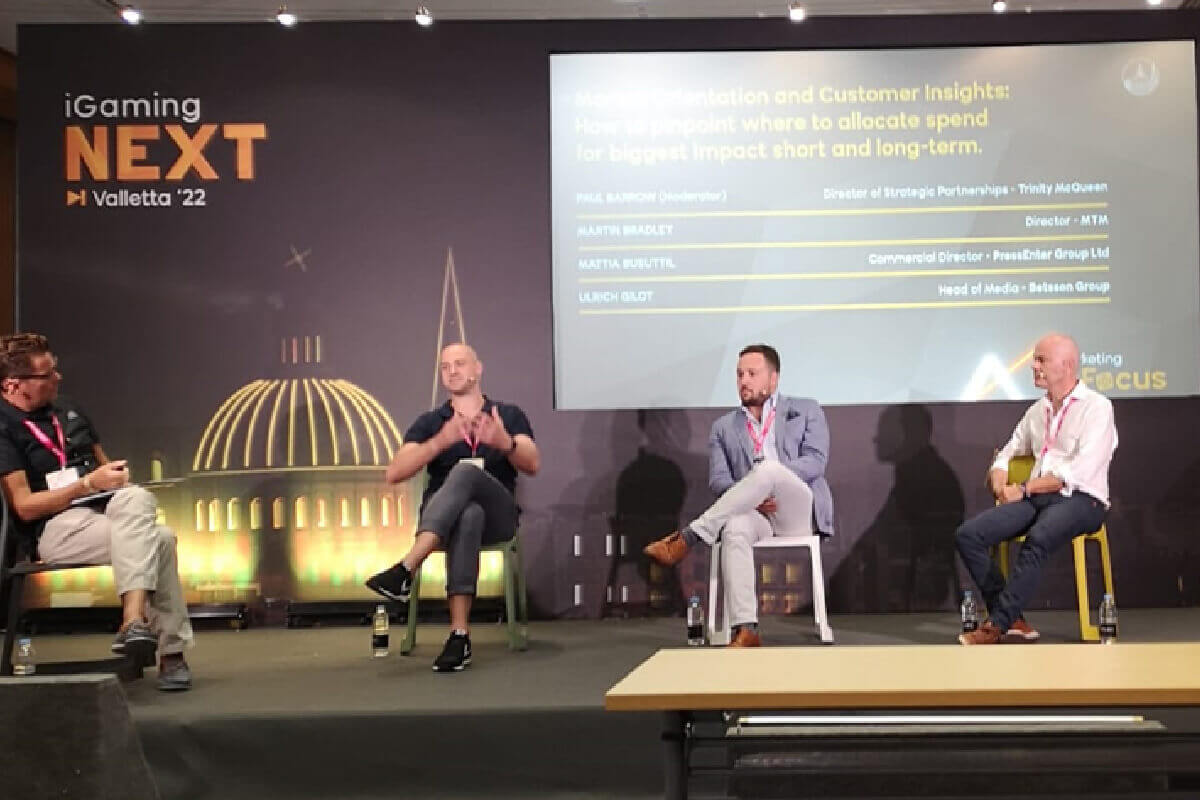After years of virtual conferences, it was a reminder of how exciting it is to meet in person with some of the most forward thinking talent in the industry flying in from all over the world. It also gave MTM an opportunity to speak about all things insight and brand strategy with Martin featuring on two panel discussions. Hit us up if you want more info on those!
After two days of enjoying a wide range of insightful presentations & panels, some September sun, lots of chat with clients both old and new (and a fair amount of wine!), here’s Martin & Tom’s key takeouts.
1. Responsible gambling is crucial, but at what cost to players?
The industry continues to take positive steps to promote responsible gambling; just take Kindred’s hugely ambitious Journey Towards Zero pledge. However there is concern that those in charge of regulation don’t consider the impact that tighter/revised regulation has on the most important people, the players.
More stringent regulations are deterring iGaming operators and providers from certain markets. Some feel that harsher regulations mean they are focused too much on how to work within these rules rather than putting players first. This leads to an increased reliance on unregulated, illegal operators; players will use operators that allow them to do what they want. Licensing status is frankly less of a concern for players.
Closer to home, there are calls for a European-wide regulation framework. An approach like this would facilitate innovation and growth for the industry. Operators and providers would be able to work towards providing a consistently good player experience, without the additional issues associated with frequently having to change their approach to fall in line with new rules. Having one set of rules everyone plays by would limit the need for constant re-licensing and adaptations, giving them more time to put players first.
2. iGaming needs to look to the wider entertainment industry as both a threat and a way to learn
iGaming is an entertainment product, and this is the context in which iGaming needs to consider who the competition is. Any particular operator/provider has direct competition, but ultimately you are competing for a share of time/wallet; the wider competition is video gaming, TV/movie streaming, sports etc. This was a common theme from the event, pushing the industry to protect itself from other entertainment products by continuing to innovate and create experiences or products with players at the core. The need for this is compounded by a rise in new businesses formed out of media brands such as DAZN Bet, Fanatics and a rumoured ESPN Bet proposition.
It’s also about learning from other entertainment products and how they are diversifying or finding new monetisation streams to keep their customers engaged beyond the core service offered. Whether that is innovative loyalty schemes, merchandise, apparel or virtual events, we need to keep learning from the wider entertainment industry to ensure iGaming continues to be at the forefront of creating the best player experiences.
3. Content diversity is more important than how many games you offer
Content providers or aggregators have long talked about how many thousands of games they offer. But that is changing. Content is less about the sheer numbers, it’s about how diverse that content is. Players care about having their most popular games that keep them coming back time after time. This needs to be complimented by truly localised games that appeal to different cultures, innovative mechanics, licensed titles that have broad appeal or social casino games to bring in new players.
Content providers are innovating to meet these needs; NFT themed slots, role-playing mechanics, streaming communities were just some of the innovations we heard about. It’s an exciting time for players, as content providers listen to needs for more engaging content rather than just more content.
4. The Metaverse is coming, whether players are ready for it or not
Companies from every single sector are talking about it, and many have taken their first steps through virtual events, digital shops or creating digital communities. iGaming is no exception. A whole stage was dedicated to the Metaverse to get operators and providers thinking about how to use the Metaverse to add a new layer of immersion, social connection, customisation and theming, to what is by nature often a solitary activity.
The event was low on real-life use cases or examples of how iGaming should embrace the Metaverse or what players actually want from a virtual experience. But what it did showcase is that the industry is taking it seriously. iGaming has long been at the forefront of technology in creating innovative products and new ways for customers to play. How the Metaverse fits in is yet to be defined, but it’s definitely going to be an exciting period as operators and providers trial new ideas.
5. Entering new markets needs a carefully executed strategy
Newly regulated markets (which are cropping up all the time) present a key opportunity area. However, many are trapped in thinking a newly regulated market means the market is new to betting altogether. This isn’t true; players have been gambling in these markets in one way or another for years; it’s the regulations, operators and formats that have changed.
Marketers need to consider this before anything. Customer and market insight is crucial to understanding cultural norms, needs and behaviours, particularly in markets with new regulations.
iGaming operators/providers need to be careful not to employ a ‘one size fits all’ model and understand there has been a whole world of betting in these markets before. Those who try to deeply understand these market-wide nuances before making strategic decisions will be the winners.
6. Players don’t understand licensing
We frequently heard from panelists that players have little understanding of licensing, rules and regulations when it comes to iGaming (even in more-established markets). Many find it hard to tell which operators are licensed and which aren’t. Marketers can’t rely on potential customers having an understanding of who to use. Those who successfully communicate their position as regulated, safe-to-use and putting players first will likely gain ground, especially in newly regulated markets.
So what does this all mean?
It’s an exciting time for iGaming, but a number of threats (both from inside and outside) remain for the industry to tackle. However our time in Malta demonstrated that there is the desire to meet these head on. The industry has always been one of the most innovative out there, and will continue to take bold steps to ensure a successful ecosystem.It also demonstrated how using data and analysis is more important than ever. The industry has arguably been too short-term focused and reliant on performance marketing, at the detriment of building stable, powerful brands for the long-term. The head-winds the industry faces means using insight to inform wider strategy and brand investment is essential to the long-term success of any provider/operator.It’s bye to Malta for now, but MTM will return next year with the iGaming industry as healthy as it’s ever been!
If you would like to talk to us about any of the themes in this mailer, please contact Martin (martin.bradley@wearemtm.com) or Tom (tom.gilbert@wearemtm.com).
Martin Bradley and Tom Gilbert
6th October 2022




